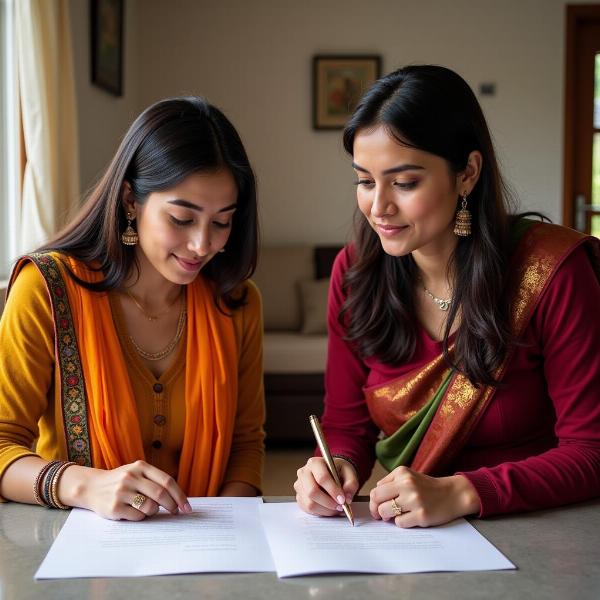Understanding the concept of a domestic partnership, especially in the context of Indian culture, can be complex. “In a domestic partnership meaning in Hindi” implies a search for a culturally relevant equivalent to this Western legal term. While India doesn’t have a direct legal framework identical to Western domestic partnerships, this article explores the closest Hindi terms and cultural parallels, along with the nuances of this evolving concept.
Understanding Domestic Partnerships: A Western Concept
Domestic partnerships are legally recognized relationships between two individuals who live together and share a life together, but are not married. These partnerships offer some of the legal rights and responsibilities of marriage, varying by jurisdiction. Key aspects include shared finances, healthcare decisions, and inheritance rights. Finding a precise equivalent in Hindi requires careful consideration of cultural nuances.
 Domestic Partnership in India
Domestic Partnership in India
Exploring Hindi Equivalents: Beyond Literal Translation
Directly translating “domestic partnership” into Hindi proves challenging. The closest approximations often involve terms related to cohabitation or live-in relationships, such as “साथ रहना” (saath rehna – living together) or “लिव-इन रिलेशनशिप” (liv-in relationship). However, these terms don’t fully capture the legal implications of a Western domestic partnership. The concept of “घरेलू साझेदारी” (gharelu saajhedaari – domestic partnership) exists, but lacks the established legal framework of its Western counterpart.
Cultural Context: Navigating Tradition and Modernity
India’s cultural landscape, steeped in tradition, primarily recognizes marriage as the foundation of family and societal structure. The concept of domestic partnerships, while gaining some acceptance in urban areas, still faces societal scrutiny. Traditional family values often influence perceptions, making it crucial to approach the topic with cultural sensitivity.
Legal Implications: The Evolving Landscape
While a specific “domestic partnership” law doesn’t exist in India, legal provisions pertaining to live-in relationships are emerging. Court rulings have granted certain rights to couples in long-term live-in relationships, including inheritance and maintenance rights. However, these rights are often subject to specific conditions and judicial interpretations. Consulting with legal experts is crucial for navigating this evolving legal landscape. For instance, understanding the intricacies of property ownership in such relationships can be complex, similar to understanding the implications of “infrastructural meaning in hindi” in business contexts.
Domestic Partnerships and Same-Sex Relationships: A Growing Discourse
The discussion around domestic partnerships in India is intertwined with the ongoing dialogue surrounding LGBTQ+ rights. While same-sex marriage is not yet legally recognized, the concept of domestic partnerships could offer a potential pathway for legal recognition and protection of same-sex relationships. This conversation is crucial for fostering inclusivity and equality within Indian society.
Conclusion: A Concept in Transition
“In a domestic partnership meaning in Hindi” reflects a search for a term that encapsulates a complex, evolving concept. While direct legal equivalence remains elusive, Hindi terms related to cohabitation and live-in relationships provide some context. Understanding the cultural nuances and evolving legal framework surrounding these relationships is crucial. As India navigates the intersection of tradition and modernity, the conversation surrounding domestic partnerships will continue to evolve, potentially shaping the future of relationships and family structures in the country.
FAQ:
- What is the exact Hindi translation for “domestic partnership”? There isn’t a single, universally accepted equivalent, but terms like “साथ रहना” (saath rehna) and “लिव-इन रिलेशनशिप” (liv-in relationship) are often used.
- Are domestic partnerships legally recognized in India? Not in the same way as in Western countries. However, legal provisions regarding live-in relationships are evolving, offering some protection and rights.
- What rights do couples in live-in relationships have in India? Some rights, including inheritance and maintenance, are being granted by courts, but they are often subject to specific conditions.
- How does the concept of domestic partnership relate to same-sex relationships in India? It is a relevant topic within the ongoing discussion about LGBTQ+ rights and potential pathways for legal recognition of same-sex relationships.
- Where can I get more information about legal aspects of live-in relationships in India? Consulting with a legal expert specializing in family law is highly recommended.
Meaning-Hindi.in is your trusted partner for accurate and culturally sensitive Hindi translation services. We specialize in various domains, from legal and business documents to technical manuals and website localization. Our team of expert linguists ensures precise translations while respecting cultural nuances. Whether you need help understanding “karobar meaning in hindi” for your business ventures or require certified translation of legal documents like those related to “dharam patni meaning in hindi”, Meaning-Hindi.in is here to assist. Contact us today at [email protected] or call us at +91 11-4502-7584 to discuss your translation needs.